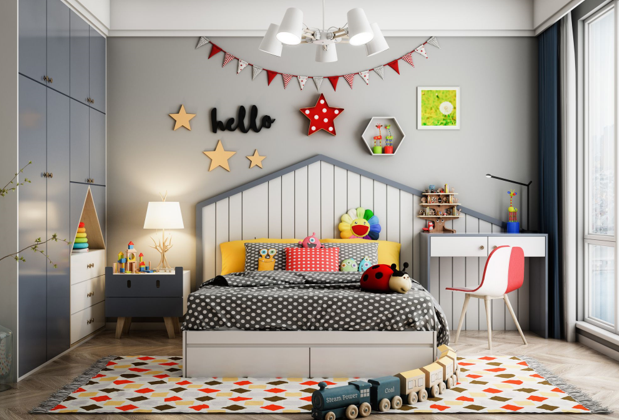Many factors influence people’s well-being, but few have as great a power as the quality of sleep. Adults spend, on average, a third of their day (and life) sleeping. In the case of young children, this proportion is even higher. According to a study published by the WHO in 2019, babies (4 to 11 months) should sleep between 12 and 16 hours a day; and children up to 4 years old should sleep between 10 and 13 hours a day.
The quality of sleep acts directly on the brain development of the child, especially during his first and second childhood (from birth to 12 years). During the rest period, the body releases the hormones necessary for growth and learning, and this is directly related to physical, motor, emotional and cognitive development. It is also known that the environment in which you sleep interferes with the quality of your sleep, and there are a number of important aspects that we must consider when designing sleeping spaces for children and babies. But if you want some 2 bedroom house plans that not only accommodate comfort for your children but also beauty, Truoba 2 bedroom house plans are what you need. Not only 2 bedroom plans, but you can also order any house plans from Truoba and make your dream home come true!
Temperature
In any age group, feeling hot or cold when sleeping causes a person to wake up before they have completed their proper sleep cycle. Providing temperatures between 18ºC and 20ºC is essential.
Adjusting the temperature of the indoor environment can be challenging. Whenever possible, natural ventilation is the most effective. But it is also possible to resort to technology: for the warmer seasons or areas, you can consider the use of air conditioning or fans, while in the case of cold seasons or areas, in addition to making sure that the openings are properly sealed. It may also be advisable to use radiators or electric heaters, or even more advanced technologies such as underfloor heating.
Darkness and lighting
During the night, it is recommended that the room be as dark as possible so as not to impair the production of the sleep hormone (melatonin). A good ally in this regard is the blackout system. Your most common options are those made with PVC (which blocks 100% of the light) and the ones made with 100% polyester fabric (capable of blocking around 80% of the light). It is common for this type of curtain to be used together with another type of thinner fabric, for daytime use.
As for artificial lighting, a good strategy is to keep central lighting, direct and attenuated, so that the illuminance levels are adjustable. When changing the diaper at night, for example, it is important that the lighting is good enough for the caregiver, allowing him to carry out the hygiene process with precision, but at the same time, that it is dark enough so as not to wake the child for full. Another good option is to include indirect lighting points. It can be in the form of niches, lamps, or even fiber optics, creating an effect of a starry sky, for example.
Be quiet
Ensuring that the sleeping environment is calm is essential. For this, the tightness of the room must be checked to reduce noise from outside. Textile materials applied to the environment can contribute due to their acoustic absorption capacity. In addition to blackout curtains, double-glazed windows are also recommended. If the environment is being designed from scratch, the walls and partitions must be designed with adequate acoustic treatment. One of the more traditional options is the use of thermoacoustic insulators such as glass wool, rock wool, polystyrene foam, cellulose, cork, among other effective options.
Soft colors
The choice of the color palette should be consistent with a calm atmosphere, necessary for a peaceful sleep. Therefore, a palette that has a neutral base, with colors such as white, shades of gray, beige or pastel colors, are very reasonable. This logic must also be repeated in the coatings and materials of the furniture. If you want or need to include stronger colors, you can define some color points in decoration elements, lamps, bedding, or other objects.
Electronic displays and devices
Generally speaking, screens are not recommended due to various factors. The WHO considers, for example, that children under 1 year should not have any contact with screens such as tablets or televisions. For children aged 2 years, the recommendation is that the child spend a maximum of one hour of his day in contact with electronic devices. This time increases gradually according to each age group, however, at any age (including adults), contact with the screens before the sleep period is not positive. This is because the blue light emitted through the screens has the power to block the production of the sleep hormone.
For all these aspects, it is not advisable to include devices such as televisions in the rooms of young children. If this is a design requirement, it should be prevented from being visible from a lying position, avoiding the consequences of contact with blue light before bedtime.
Flexibility
Planning a room for the arrival of a baby requires a large investment. Therefore, it is advisable to think about distribution with flexible furniture, which is efficient and safe for babies, but which is also useful in the first years of the child’s life. Choosing a low bed instead of a crib, or designing a crib that can later be turned into a bed is quite advantageous. You can also take advantage of the internal space of the closet as a changing table or transform the diaper changing space into a height-adjustable table, for example. If you adhere to the above points then you can design a healthy sleep environment for your children.
Opting for Bed Kingdom’s kids beds, such as a low bed or a convertible crib that can later be transformed into a bed, provides a practical and cost-effective solution. Additionally, using the internal space of the closet for a changing table or incorporating a height-adjustable table for diaper changes ensures efficient use of the room.
- Chancellor Aviles-Ramos Announces Mid-Year Hold Harmless For NYC Schools
- Happy Thanksgiving Harlem, To The Greatest Community In The World
- Embracing Nature: The Benefits Of Using Natural Body Cleansers And Skincare Products
- Sponsored Love: Le Beau Absolu’s Unisex Fragrances, Scent Stories For The Modern Narrative
- Sponsored Love: The Rise Of Wall Art In Australia
Become a Harlem Insider!
By submitting this form, you are consenting to receive marketing emails from: . You can revoke your consent to receive emails at any time by using the SafeUnsubscribe® link, found at the bottom of every email. Emails are serviced by Constant Contact










